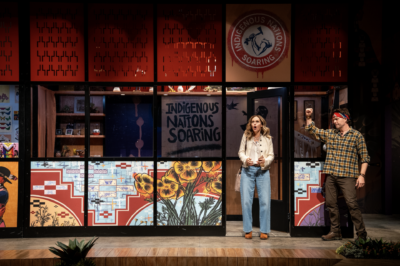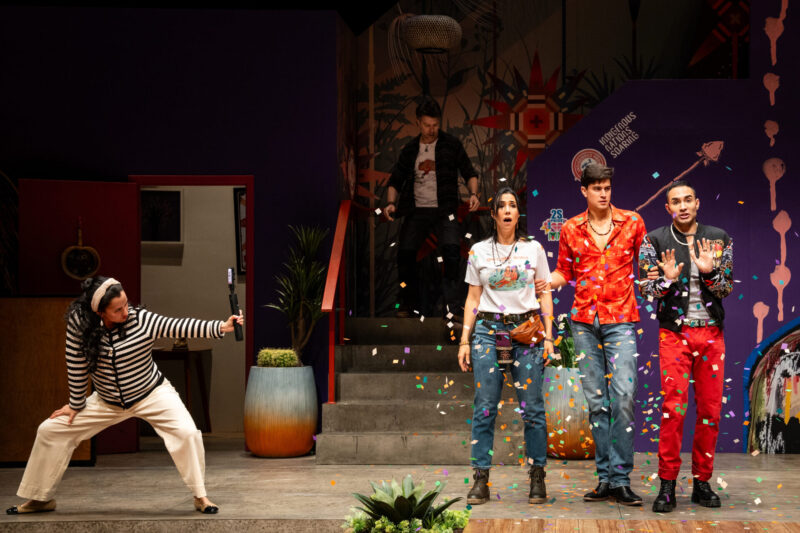Is It a Farce or Is It History? Native American Playwrights as Public Historians
23 April 2025 – Laurie Arnold
methods, theater, community engagement, Native American, Indigenous People, decolonization, inclusive history
Not long ago, I described Native playwrights as public historians because their plays speak directly to audiences, their narratives confront the past as well as illuminate it, and playwrights bring life to histories Americans have forgotten or perhaps never learned. Whether through comedy or drama, satire or farce, Native playwrights are bringing complex histories to the stage.

Amy Brenneman (River) and Noah Bean (Theo) in Fake It Until You Make It at Arena Stage, running April 3 – May 4, 2025. Photo by Daniel Rader and courtesy of Arena Stage.
Fake It Until You Make It by Larissa FastHorse (Sicangu Lakota) is a contemporary story set in a coworking space shared by several nonprofits, all of which are Native-serving and/or Native-run. At first, the play doesn’t seem to be about the past at all. Then we meet characters dedicated to eliminating resource-hungry invasive plants that have pushed native plants out of their traditional habitats. We see the prickly rivalry between River–a non-Native ally who runs an Indigenous-serving organization–and Wynona, a Native woman whose organization is fighting the invasive plants. River has worked successfully with tribes for years and considers reservation-based projects more important than Wynona’s urban-centered N.O.B.U.S.H. anti-butterfly bush endeavor. Wynona bristles that a non-Native person is deciding what Native priorities should be. Throughout the play, the two engage in a series of battles when they realize they are competing for the same tribally funded grant. These battles echo a century of dialogue between non-Native outsiders defining Native American authenticity and Native people living self-determined lives.
Colonialism, paternalism, cheeky word play: FastHorse has given audiences a Native-authored farce. Farce relies on characters creating or finding themselves in improbable situations, on mistaken identities and misunderstandings, and on deliberate absurdity. FastHorse uses these conventions to tell Native stories of colonization and survival and to highlight how non-Native outsiders (even allies) seek to set priorities for Native people.
The improbable situations and deliberate absurdity also lay the foundation for the crux of the play: discussions of Native identity, what it means, and who decides. Theo, Wynona’s non-Native boyfriend, wants to marry her, but she reminds him that she can’t because she has a responsibility to her tribe; she must have children with a fellow tribal member so their children will be enrolled citizens of their nation. Wynona has no one in mind for this idealized union, but she knows having children with Theo would mean their children’s blood quantum would be too low for her tribe’s enrollment requirement.

Noah Bean (Theo) and Shyla Lefner (Wynona) in Fake It Until You Make It at Arena Stage, running April 3 – May 4, 2025. Photo by Daniel Rader and courtesy of Arena Stage.
This scene is brief and amusing, as Theo has clearly pled this case before, but it also introduces audiences to the deeply serious realities of Native American tribal citizenship. Tribes are sovereign nations. Native people are citizens of tribal nations, and determining citizenship is an act of tribal sovereignty—tribes’ inherent right to self-govern. Many tribes have chosen to use blood quantum, a practice established by the US in the nineteenth century, to determine eligibility for tribal enrollment. Each tribe has a roll, a list of tribal families, created by the federal government on a given date. After that date, the roll was closed. Every person on that roll was assigned a degree of “Indian” blood—4/4, one-half, one-eighth, and so on—and tribal citizens and lineal descendants can still trace their kinship ties through these rolls. Many Native people critique blood quantum as a tool of colonization designed to erase Native people generation by generation. Wynona’s commitment to having children with another tribal citizen is grounded in resisting that erasure.
Later, amidst even more heightened comical misunderstandings, FastHorse brings audiences to another discussion of identity: race shifting. Reversal of expectations is a hallmark of farce, and the founder of the newest nonprofit in the coworking space introduces that reversal. Grace is Native American but asserts that she does not always want to dwell in that identity. She does not describe herself as multi-racial but instead shifts into different races where she feels (or wants to feel) at home. We see her in a Mexican folklórico ensemble, in HBCU gear and Nike Air Jordans, in a sari, and in an outfit straight from the 1980 preppy handbook. Her nonprofit aims to help people race shift ethically. When her coworking colleagues loudly and incredulously argue with Grace’s premise, decrying race shifting as unethical and fraudulent, Grace asks what harm it really does. She maintains, for example, that tribes still have sovereignty even when an individual claims Native ancestry they don’t have. In fact, such claims compromise tribal self-determination to define kinship and citizenship.
There is no ethical way to claim ancestry that does not belong to us. When one of the characters ultimately decides to become Native, their satisfaction is palpable. They feel victorious and relieved to finally possess what they have always wanted and long felt entitled to: Native American identity. Their self-representation will always be false and incomplete, however—one cannot be Native without a tribe or kin to welcome them home.

Burgandi Trejo Phoenix (Grace), Noah Bean (Theo), Shyla Lefner (Wynona), Eric Stanton Betts (Mark), and Brandon Delsid (Krys) in Fake It Until You Make It at Arena Stage, running April 3 – May 4, 2025. Photo by Daniel Rader and courtesy of Arena Stage.
As public historians, we might present exhibits about Native American citizenship in the museums, historical societies, libraries, and public spaces where we gather to engage in dialogue and inquiry. We may hold discussions about Native identities in these same spaces, reassuring audiences that it’s OK to ask questions when they consider these complex topics. Tribes and Native communities have long encouraged cultural institutions and academic scholars to recognize the legitimacy of Native knowledge and intelligence and to include wisdom shared by Native people in our interpretive work and scholarship. Like our audiences, we can’t learn if we don’t ask. In 1996, Clara Sue Kidwell (Choctaw) edited a special issue of The Public Historian that “challenged public historians to re-present American Indian histories,” and recently the American Association for State and Local History (AASLH) created a resource kit for institutions engaged in decolonizing and Indigenizing museum interpretation. Of special note are two Native-led organizations that model practices to foster tribal cultural and political sovereignty. The Association of Tribal Archives, Libraries, and Museums (ATALM) offers resources and training for working with tribal materials and hosts an annual conference dedicated to discussions of interpretation, conservation, and building effective partnerships. The Native Governance Center created this guide for non-Native people seeking to partner with Native Nations in a good way. I suggest we see Native theatre and then employ some of these excellent practices as we go to work.
In Fake It Until You Make It, Larissa FastHorse gives the audience permission to laugh with, and at, the characters as they strive to resist the absurd colonial structures that still somehow influence their lives. Within the context of these nonprofits’ focus on invasive species, using English ivy as a stand-in for colonialism is brilliant. FastHorse connects invasive species to ethnic frauds, calling out the opportunism and self-interest of both. At the same time, she reinforces that Native people and their tribal identities are affirmed through community and family, not proven via DNA testing. FastHorse and other Native playwrights would not characterize themselves as public historians, but I see them working right alongside us as we all endeavor to make sense of our worlds.
Fake It Until You Make It runs at Arena Stage in Washington, DC, April 3-May 4, 2025.
~Laurie Arnold is an enrolled citizen of the Sinixt Band of the Colville Confederated Tribes. She is Professor of History and Director of Native American Studies at Gonzaga University.



